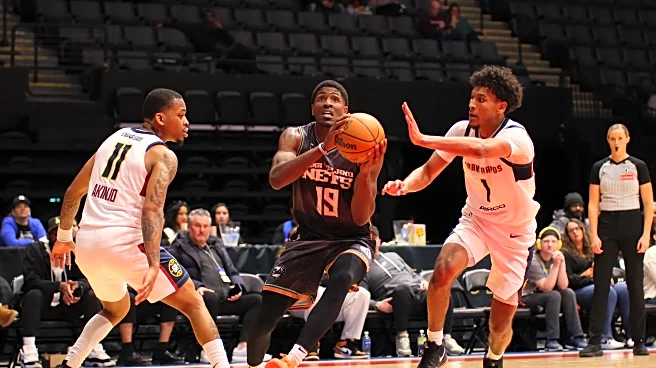What's Happening?
Novak Djokovic marked his victory over Taylor Fritz in the U.S. Open quarterfinals with a unique celebration. After securing a 6-3, 7-5, 3-6, 6-4 win, Djokovic performed a dance inspired by the movie 'KPop Demon Hunters' in Arthur Ashe Stadium. The dance was taught to him by his daughter, Tara, who celebrated her 8th birthday on the same day. Djokovic expressed that the win was a special gift for Tara, who was not present at the event. He hopes to bring a smile to her face when she watches his performance. The dance is based on the popular Sony Pictures/Netflix film, which has gained significant attention globally, including topping the Billboard Soundtracks chart.
Why It's Important?
Djokovic's celebration highlights the intersection of sports and popular culture, showcasing how athletes can connect with broader entertainment trends. The gesture underscores the personal side of professional sports, where family moments are cherished alongside career achievements. This event also reflects the growing influence of K-pop and related media in global culture, as seen in the widespread popularity of 'KPop Demon Hunters.' The film's success on streaming platforms and music charts indicates a shift in entertainment consumption, impacting industries such as film, music, and sports marketing.
What's Next?
Djokovic's performance may inspire other athletes to incorporate personal and cultural elements into their celebrations, potentially influencing fan engagement and media coverage. As the U.S. Open progresses, Djokovic will continue to compete, with fans and analysts watching closely to see if he brings more personal touches to his matches. The popularity of 'KPop Demon Hunters' may lead to further collaborations between sports figures and entertainment media, expanding the reach of both industries.
Beyond the Headlines
The dance celebration by Djokovic could spark discussions on the role of cultural expressions in sports, exploring how athletes use their platforms to share personal stories and connect with diverse audiences. This event may also prompt analysis of the impact of global entertainment trends on sports, considering how cultural phenomena like K-pop influence fan experiences and athlete branding.









